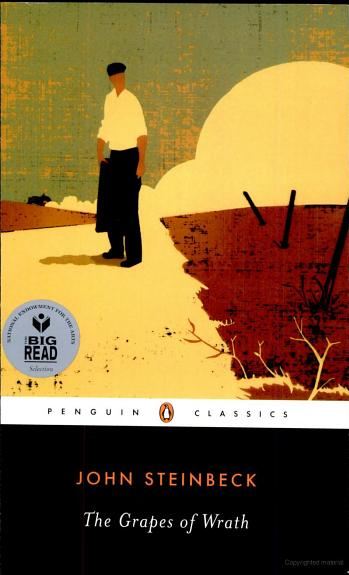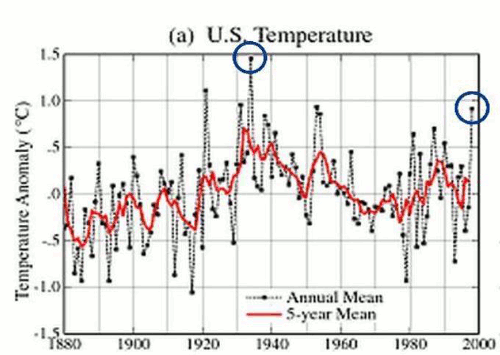One 1930s record which USHCN can’t adjust downwards, is Steinbeck’s 1939 novel The Grapes of Wrath. The story centered around people surviving the extreme heat, drought and hardships of the 1930s.
Empirical evidence does not lend much support to the notion that climate is headed precipitately toward more extreme heat and drought. The drought of 1999 covered a smaller area than the 1988 drought, when the Mississippi almost dried up. And 1988 was a temporary inconvenience as compared with repeated droughts during the 1930s “Dust Bowl” that caused an exodus from the prairies, as chronicled in Steinbeck’s Grapes of Wrath.
Hansen’s graph at the time was consistent with his statement. The 1930s was the hottest decade – by far. But since then, some people have been rewriting history.
They can change graphs, but one thing they can’t change is literature. Here are some excerpts from Steinbeck’s novel:
This land, this red land, is us; and the flood years and
the dust years and the drought years are us.
Beyond the fence, the corn lay beaten down by wind and heat
and drought, and the cups where leaf joined stalk were filled with
dust.
Granma had convulsions from the heat, and she was weak when
they stopped.
The camp was quiet in the blinding heat, but the
noises of hot grass- of crickets, the hum of flies- were a tone that
was close to silence.
While the sun it was a beating, flailing heat, but now the heat came from
below, from the earth itself
And now they were in flight from the sun and the drought.
Then crop failure, drought, and flood were no longer
little deaths within life, but simple losses of money.




I love a sunburnt country,
A land of sweeping plains,
Of ragged mountain ranges,
Of droughts and flooding rains.
I love her far horizons,
I love her jewel-sea,
Her beauty and her terror –
The wide brown land for me!
Dorothea Mackellar, 1904
Droughts and flooding rains back then? They must have needed a Carbon Tax as well. Carbon Taxes will save everyone.